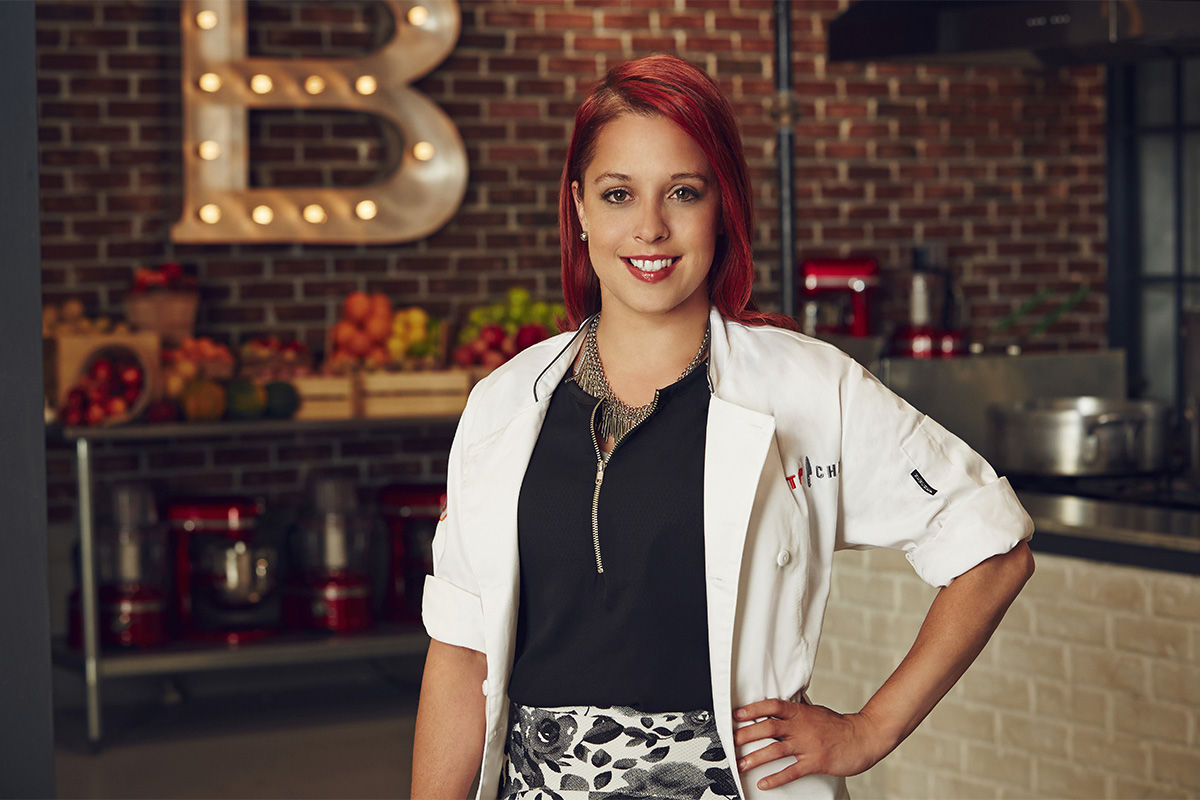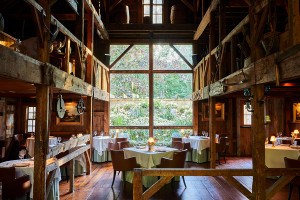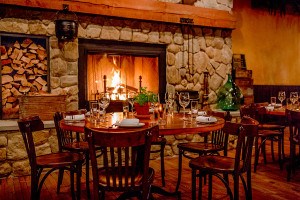Chef Stacy Cogswell Breaks Down the Top Chef Boston Debut

Contestant and Regal Beagle chef Stacy Cogswell. Photo by: Tommy Garcia/Bravo
Top Chef made its Boston debut Wednesday night and there was plenty of local fanfare. Chefs Barbara Lynch, Ming Tsai, Ken Oringer, Michael Schlow, and Lydia Shire all showed up to dish out sentimental favorites from their repertoires. The word “historical” was thrown around a lot by Padma Laskshmi and new judge Richard Blaise to describe Season 12’s setting. For the third season in a row, a local chef—this time The Regal Beagle’s Stacy Cogswell—made a positive first impression. And the producers at Magical Elves even introduced new elements such as no-holds-barred approach to the judge’s interaction with contestants.
To help us break down this season, we’ve asked Cogswell to give us her insider perspective on each episode. Here, Cogswell recaps all the action, including the emotions involved in seeing herself on TV, the canned cranberries and peas that inspired her final dish, and her starstruck interaction with Mayor Marty Walsh.
How are you feeling after the first episode?
The adrenaline was so high after seeing myself on TV that I didn’t sleep last night.
Former contestant Richard Blaise, who’s now a judge, said that competing on Top Chef can “change your career and your life.” Do you think the show could have a significant impact on your life?
It’s hard to say right now because everything still feels very surreal. Between seeing yourself on TV and still running a restaurant, it feels like that weird situation where you wake up from a dream, but you still feel like you’re in a dream. I’m hoping it’ll do great things for the restaurant and my career, but everyone has a different experience.
Has participating on the show always been a goal of yours or was it more of a happy accident?
It’s definitely a newer thing. It’s something I never really thought about. I was always just focused on cooking and food because I love to eat. They approached me about the opportunity and I said, “Yeah, let’s do this, it sounds like fun.”
The first Quickfire Challenge paired the chefs into teams of four and tasked them with completing a New England-themed mise en place relay—three lobsters, 20 oysters, eight mackerel, and 21 littleneck clams. Was there any particular ingredient you were fighting for?
Oh, I was so excited to see all those things on the table. I told my team, “I don’t care, I’ll do whatever.” Having worked at the Atlantic Fish Co., I’d had plenty of practice with raw bar. I was comfortable with everything, so I was psyched.
I’m assuming this won’t be the last New England-themed challenge. Coming from Boston, does that give you an advantage?
The only advantage I thought that I had going into the competition was that I’m familiar with the local ingredients and work with them all the time—and have been working with them my whole life. But as chefs, all the familiar Boston dishes, they’re familiar nationwide now.
Your fellow competitors all seem to have very strong resumés. George Pagonis works with Mike Isabella at Kapnos in Washington, D.C., Mei Lin works at Ink with Michael Voltaggio, and the list goes on. Contestant Joy Crump professed to feeling severely underqualified. Did that roomful of chefs intimidate you at all?
No, ultimately we all do the same. The only thing that’s different is our style of cooking. We all worked hard and, if we hadn’t, we wouldn’t be on the show. To me, I just looked at everyone like what they were: chefs. They’re all just people. And when you’re standing in the Top Chef kitchen for the first time, it’s hard to think of anything else. You’re just so nervous.
What was a bigger thrill: meeting Tom Colicchio for the first time or Mayor Walsh?
Ha! It’s probably equal, but I have to admit I was pretty excited about meeting the mayor. It was nerve-wracking knowing that I was going to get to meet him, but when he finally came over and found out I was the local, he was so nice and so sweet. It actually calmed my nerves a little because—even though I’d never met him—it felt familiar. Plus, the fact that I was able to high-five him was pretty funny.
During the Elimination Challenge, the first ever Top Chef Food Festival, you were shown chatting with two former Boston contestants, Kristen Kish and Tiffani Faison. Was that the first time you had met them and did they give you any advice?
That was the first time I had met Kristen, but not Tiffani. That’s why they showed me reaching out my hand to Tiffani to “introduce myself,” which was kind of the joke between her and I. But Kristen was so sweet and gave me a glass of wine. Regarding getting any advice, I didn’t tell anyone I was going on the show prior to the competition. I took that very seriously.
The theme of the challenge was to prepare a meal based on the first thing you remember cooking. Can you describe what you prepared and why?
I made a pulled chicken salad with sweet pea green goddess on a thick cut potato chip with cranberry mostarda and a crispy chicken skin. The first real thing I remember cooking was with my uncle and it was a roast chicken dinner. It was so simple, you know it was just like: put a chicken in the oven, make mashed potatoes, open a can of peas, and open a can of cranberry sauce. So, when they told us what the challenge was, it was like, “Oh shit, how am I supposed to make a whole chicken dinner and fit it into two bites?”
One of the major changes during this year’s season is the judge’s candid interaction with the chefs. Blaise, Colicchio, and Padma Lakshmi were all shown doling out fairly harsh criticism to some of the contestants. Do you think that’s a good thing for the show, and how did they respond to your dish?
Padma said it was delicious, which was awesome. Honestly, though, last night was the first time seeing them react to other contestants’ dishes. I didn’t see a lot of that because I was too wrapped up in what I was doing. But it’s still a competition and that’s what everyone has to remember. The judges aren’t there to sugarcoat things, they’re there to find the next Top Chef. You don’t do that by handing out puppies and rainbows. And it’s like anything else, if someone is going to say something bad about you, I’d rather it be to my face instead of behind my back.
Another surprising element they’ve introduced in Top Chef Boston is having all the chefs present when they eliminate a contestant. Did that take you by surprise?
Oh man, that was frightening. It really was. It was very new and scary for all of us.
But in the back of your mind, weren’t you thinking that they might not eliminate anyone because they asked everyone to Judge’s Table?
No, in the back of my mind I was thinking, “Shit, here we go!” I went into the competition that knowing anything could happen. Before the competition, I was thinking maybe I should prepare myself in some way, but how the hell do you prepare when you have no idea what’s going to be thrown at you? I did a lot of reading and a lot of brainstorming, but that’s about all you can do. It’s really like studying for a test and going into it blindly.

